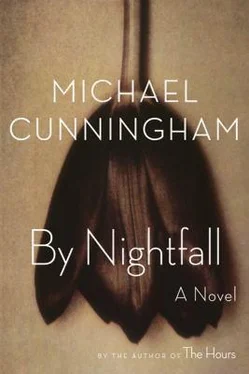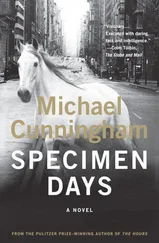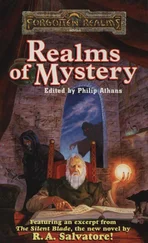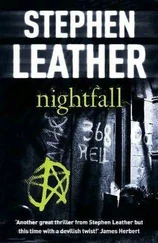He says, “Are you telling me you want to separate?”
“I’m sorry. I’ve been thinking about it for a long time.”
How long? How long have you been impersonating satisfaction?
“I don’t know what to say.”
She sits up, faces him squarely. Her eyes are dull. She says, “I seem to have had some unspoken deal with myself, where if I could make Mizzy happy, I’d be able to be happy myself.”
“Do you think that’s a little…”
She laughs, a hollow sound. “Crazy? Yes.”
“And you’d really leave me because Mizzy has moved to San Francisco?”
“I wouldn’t leave you,” she says. “We’d call it quits, you and I. We’d say farewell.”
Is it possible that this monolith Peter has called his marriage is, has always been, so flimsy? Is it possible that all his secrets, his second-guesses, his cajolings and seductions, have been unnecessary? Did one of them simply have to… call it off, and poof?
His face has gone clammy. He struggles for a breath.
“Rebecca,” he says. “Explain this to me. You’re telling me you’ve decided we should split up because your feckless brother has moved to San Francisco to work in computer graphics.”
“He’s not going to work in computer graphics,” she says. “He’s just going to do drugs in a new place.”
“Be that as it may.”
She examines her fingertips. And then suddenly, violently, she puts her index finger into her mouth and bites down on it.
“I’m a complete idiot,” she says.
“Stop. Don’t say that.”
Her face has taken on a panicked, feral look.
“I always thought I was building a place Mizzy could come to,” she says. “Since he was a lost little boy. I knew our family couldn’t handle him, I mean they look romantic from a certain distance but they can’t really manage much of anything. And now it seems that’s not really what I wanted at all. I wanted to be Mizzy. I wanted to be the troubled one. I wanted to be the one somebody has to take care of.”
Peter wants to slap her. He wants to do that.
He says, “Don’t I take care of you?”
“I don’t mean to be cruel. I’m sorry.”
It is all Peter can do to say, “No, tell me more.”
“I feel like a stranger here, Peter. I come home sometimes and think, who lives here? I do love you. I did love you.”
“You did.”
What about all those dinners together, what about our Sundays?
“No, I do, I do love you, but I’m… I’m all messed up. I feel like I’m falling away from everything.”
She bites down on her finger again.
“Don’t do that,” Peter says.
“I’m a rotten mother. To everybody. I couldn’t help Bea, I couldn’t help Mizzy. I’m just a child who’s learned to impersonate an adult.”
Peter works to stay conscious. What should he say to her, what does he want to say to her? That all her efforts to produce a sanctuary for her little lost brother were undone by her besotted husband, who drove Mizzy away not with love but by keeping a secret? Should he tell her that in all likelihood she’s been wrong all these years, the young prince is, sad to say, just a cheap hustler, who was happy enough to run scams out of the temple she’d built for him?
Isn’t it the way? We build palaces so that younger people can break them up, pillage the wine cellars and pee off the tapestry-draped balconies.
Look at Bea. Didn’t they think that she’d love to live in SoHo; that she’d want to grow up wearing tight little Chanel skirts and playing in a band? Did they imagine that their desire to make her happy would prove to be the monster scratching at her window?
Do we ever give anyone the gift they actually want?
How did he forget that Rebecca has a life of her own, and that the ongoing work of being Rebecca doesn’t always hinge on him?
“You’re not rotten,” he says. “You’re human.”
She says, “Wouldn’t you rather be free?”
“No. I don’t know. I love you.”
“In your way.”
In your way. A soul-wave rises in him, a surge of intolerable sadness. He has failed everyone. He has neither heard nor seen.
“We shouldn’t separate,” he says. “Not now.”
“You think we should just go on?”
He stops himself from saying, Yes, that’s exactly what we should do. We should just go on.
Wouldn’t he have left her, if Mizzy had so much as given the nod?
What he wants. To cough up whatever is lodged in his gut, and go to bed. Wake eventually to his old impossible life. He does want that.
Finally she says, “I guess we could try.”
He nods.
Is it this, then? Is it compassion for another, is this all that actually matters? To love, to forgive, to abide?
It isn’t that simple. The ability to care for another being, to imagine what it’s like to be another person, is part of the tumble. It’s essential to the odd saint or two (if such creatures as saints exist) but it’s only one aspect of a life, a big ambiguous motherfucking heartbreaking life.
Still. It isn’t nothing.
Rebecca is no longer Galatea, she is no longer Olympia. Time robs us and robs us and when we beg for mercy, it robs us some more. Here is her tired face. Here is her future face, hollowed and pallid, which arrives daily, a face that will (like Peter’s) be ever less capable of arousing the ardor even of a hapless Mike Forth, or a scheming, narcissistic Mizzy. She’s got a strand of her own dark hair plastered into her pale forehead.
At the moment they resemble nothing so much as an anonymous couple in a depot somewhere, huddled together, glad for the room’s warmth, if nothing else.
Small grayish snowflakes tumble and swirl, swirl and eddy and tumble against the window.
Peter glances out at the falling snow. Oh, little man. You have brought down your house not through passion but by neglect. You who dared to think of yourself as dangerous. You are guilty not of the epic transgressions but the tiny crimes. You have failed in the most base and human of ways—you have not imagined the lives of others.
Out there, beyond the glass, Bette Rice is laughing over a glass of wine with her husband. Mizzy is in midair, watching a romantic comedy on a miniature screen as The Magic Mountain lies open on his lap. Bea is getting ice from the cooler behind the bar, thinking she’s tired of what she’s doing, maybe she should travel, maybe she should… go someplace. Someplace else. Uta is standing at her bedroom window, smoking a cigarette and thinking about blank white canvas.
Snow is falling into the urn in Carole Potter’s garden, falling on the herb beds, into the petaled mouths of the oregano flowers. A white snow-sheet blows over the empty garden as skeins of falling snow turn and twist in the silvered dark.
There is no one there to see it. The world is doing what it always does, demonstrating itself to itself. The world has no interest in the little figures that come and go, the phantoms that worry and worship, that rake the graveled paths and erect the occasional rock garden, the bronze boy-man, the hammered cup for snow to fall into.
It’s the last snow of the year. After tonight, the days and nights will grow steadily warmer, the hard little buds on the Potters’ yew trees will burst open and bloom.
And here, on this cold night, are Peter and Rebecca, in their familiar bedroom.
Something rises in Peter, more like a plant being uprooted by an invisible hand than a levitation of soul. He can feel the hairlike roots extracting themselves from his flesh. He is being lifted out of himself, shedding the husk of self, that sad hungry man, the action figure with the indifferently painted eyes and the dashed-off polyester suit. But if he’s been a clownish figure he has also been (please God) an acolyte, a lover of love, and his little earthly cavortings were meant to appease a deity, however silly and inadequate his offering. He can see the snow falling and he can see the room from outside the window, a modest chamber worried by weather but fast for now, home for now, to him and his wife, until others take their places. If he died or if he just walked out into the dark, would Rebecca feel his ongoing presence? She would. They have come too far together. They have tried and failed and tried and failed and there’s probably, in the final analysis, nothing left for them to do but try again.
Читать дальше
Конец ознакомительного отрывка
Купить книгу












